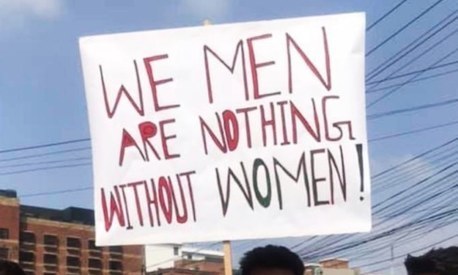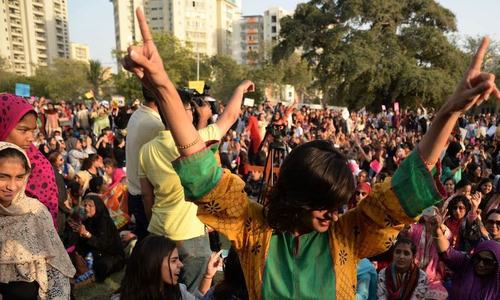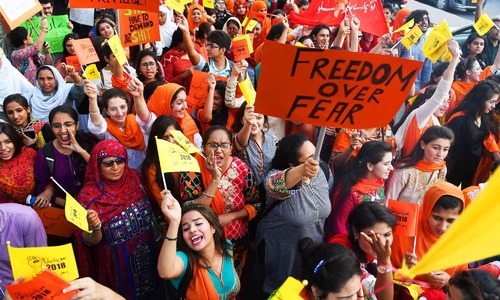MANY South Asian men have been unable to come to terms with this slogan — too bad for them. They are fighting a rearguard action because the arc of history has been bending towards equality. In the West, slaves have gained equality as have Jews, while people of colour and women have made significant gains. In South Asia, Dalits continue to advance their rights. Contrary cases of infringement of minority rights invite universal condemnation. So, it is only a matter of time before women effectively obtain the rights that are guaranteed to them under most constitutions.
Objections against the slogan raise interesting issues. Consider the men who protest their support for women, but suggest more appropriate slogans. The irony in doing so is lost on them. This is precisely the suffocating embrace of patriarchy the women are contesting. By subjecting the modalities of struggle to their approval, men deny women the agency that is their right which includes the right to be wrong. Men deciding for women is an anachronism no longer acceptable to many.
But there is a deeper irony at play. This slogan, or at least its essence, was directed first to men. And, more surprisingly, it was not oppressed men raising it against their oppressors. Quite the contrary, it was the oppressors who forced ‘your body, your choice’ upon the oppressed.
Here is the back story. Capitalism, gaining strength in 17th- and 18th-century Europe, had two essential pillars: the sanctity of private property and the free availability of wage labour. Under feudalism, which preceded capitalism, labour was unfree, bound to feudal lords. In order to break this bond, the ideologues of capitalism extended the analogy of private property to the human body. The view was propagated that workers owned their bodies and could do with them what they chose free of the ties that indentured them to feudal lords. Meanwhile, the accompanying Enclosure Movement turned all land into private property depriving peasants of sustenance from common holdings. Thus were free labourers created to do with their bodies as they chose. It was another matter that the only choice was to sell their bodies to the highest bidder.
Objections against the slogan raise interesting issues.
There was one positive though unintended outcome of this new enslavement: the emergence of civil rights. The body, now private property, was entitled to the same protection as land or capital. Violating its sanctity became a crime subject to legal redress. And this set into motion a new dynamic in Europe. Once all bodies were acknowledged equal under the law, it was logical to demand an extension to the right to vote. A struggle for political rights ensued, progressively extending the franchise and culminating in universal suffrage; women were the last to be included, as late as the 1940s. Political rights were then leveraged to wrest economic rights like minimum wage, unemployment insurance, and retirement benefits. This journey from civil to economic rights was spread over almost 300 years, and it was not repeated in the same sequence in other parts of the world.
In South Asia, for example, one of the most unequal societies in the world, political rights came first, a consequence of the end of colonial rule. These political rights yielded a modicum of economic rights, most obvious in the case of Dalits in India. But conspicuous by their absence were any semblance of civil rights acknowledging the sanctity and equality of the human body. Dr. Ambedkar noted this straight away when he pointed out soon after Independence that one-person-one-vote could yield one-vote-one-value, but not one-person-one-value. Only a regime of civil rights could ensure the latter.
This brings us full circle to the ferocity encountered by the women’s movement and the underlying threat of interpersonal violence pervasive in South Asia. The infliction of pain on the human body is commonly viewed as a just and effective corrective. This explains popular views that South Asians can only be ruled by the stick, that suspects ought to be beaten till they confess, or that unpopular leaders should be strung upside down or lined up against a wall and shot. It is in this milieu that men could be slapped and women thrashed, or spat upon, or shamed to be taught a lesson with no consequences whatsoever.
We are far from the day when opposing views can be engaged with in a civil manner without threat of violence. The women’s movement, if only for highlighting this issue, is playing a salutary role in dragging us into a more civilised future.
Finally, one should not minimise the perils of translation. The body is just a body in the West. In South Asia, men, and many women, divest it of its vestments. The road to the future passes over rocky cultural terrain on which Neanderthals not only continue to roam, but are often invited to grace the insides of TV studios.
The writer is the author of Transgressions: Poems Inspired by Faiz Ahmed Faiz, Delhi, 2019.
Published in Dawn, March 17th, 2020















































